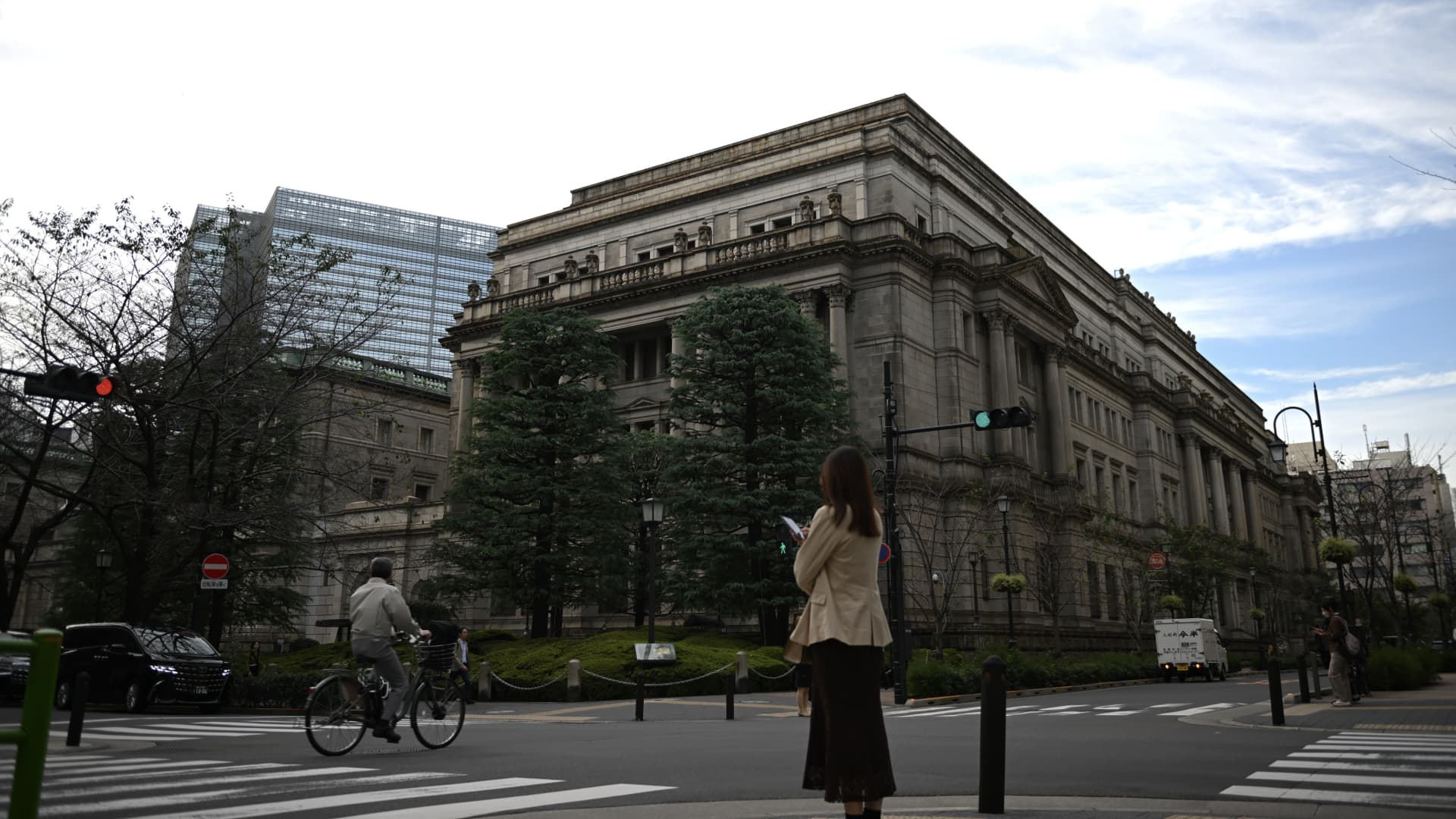The Financial institution of Japan (BOJ) headquarters in Tokyo, Japan, on Thursday, Oct. 31, 2024. The Financial institution of Japan saved its benchmark rate of interest unchanged whereas sticking to its view that it is on observe to attain its inflation goal, an outlook that factors to the potential of one other charge hike within the coming months.
Getty Pictures
The Financial institution of Japan on Thursday held its benchmark rate of interest regular at 0.25%, opting to take the time to evaluate the affect of monetary and overseas alternate markets on Japan’s financial exercise and costs.
The yen weakened 0.3% towards the greenback after the speed choice, buying and selling at 155.42 and hitting a one-month low. In the meantime, the nation’s Nikkei 225 was down 0.85%.
The choice to carry charges stunned economists polled by Reuters, who had anticipated a 25 foundation factors hike. Stateside, the U.S. Federal Reserve on Wednesday lower charges by 25 foundation factors, bringing the federal funds charge to 4.25%-4.5%.
The BOJ mentioned in its assertion that the choice to carry was a break up 8-1 choice, with board member Naoki Tamura advocating for a 25-basis-point hike.
The central financial institution did be aware, nevertheless, that there “stay excessive uncertainties surrounding Japan’s financial exercise and costs.”
“Particularly, with companies’ habits shifting extra towards elevating wages and costs not too long ago, alternate charge developments are, in comparison with the previous, extra more likely to have an effect on costs,” the financial institution added.
Analysts from funding financial institution Credit score Agricole Securities Asia mentioned the choice to depart charges unchanged was because of the BOJ’s lack of ability to beat opposition from the federal government for a 3rd charge hike amid rising issues that actual GDP progress could be unfavourable in 2024.
Japan’s GDP has seen a year-on-year contraction for the primary two quarters of this 12 months, solely recording a 0.5% achieve within the quarter ending September.

The BOJ’s choice was according to a CNBC ballot, which confirmed that 13 out of 24 economists anticipated the BOJ to maintain its key rate of interest unchanged in December earlier than elevating the speed on the subsequent assembly in January.
The survey was performed between Dec. 9-13, earlier than the Fed signaled that there could be fewer charge cuts in 2025.
The BOJ “will resume its tightening cycle earlier than lengthy,” Marcel Thieliant, head of Asia-Pacific at Capital Economics mentioned in an announcement after the choice. Capital Economics expects a hike in January after a brand new set of financial forecasts are available.
Thieliant added “it is price noting that, not like in October, the choice to depart charges on maintain was not unanimous,” pointing at Tamura’s vote to boost charges to 0.5%.
Economic system nonetheless resilient
Latest financial information from Japan remains to be at present supporting the case for a charge hike. Headline Inflation in October got here in at 2.3%, the thirtieth straight month that inflation has crossed the BOJ’s 2% goal. November’s inflation information will are available on Friday.
Enterprise sentiment amongst giant corporations in Japan additionally got here in greater than anticipated within the newest BOJ Tankan survey, with the index for big manufacturing companies climbed to 14 within the quarter ended December, up from 13 within the September quarter and beating the 12 anticipated from economists polled by Reuters.
The index tracks enterprise sentiment within the nation amongst giant corporations and contributes to the BOJ’s issues when forming financial coverage. The next determine signifies that optimists outnumber pessimists, and vice versa.
In a Dec. 13 be aware, analysts from Financial institution of America mentioned that the December Tankan survey signifies Japan’s economic system stays resilient.
They added that “this additionally confirms that the economic system and inflation are trending according to the BoJ’s base case state of affairs (which is its prerequisite for elevating rates of interest).”
Nevertheless, this doesn’t imply that the necessity for a charge hike is pressing. The analysts mentioned that imported inflationary stress is receding, whereas corporations’ medium-term inflation expectations stay steady regardless of the upcoming begin of President-elect Donald Trump’s administration and the danger of commerce tariffs.



